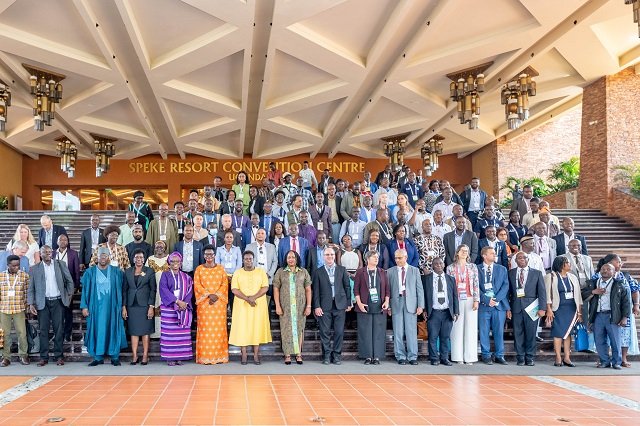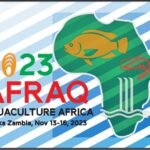
Kampala, Uganda – The organizers of the Aquaculture Africa 2025 Conference (AFRAQ25), also known as the World Aquaculture Safari 2025 – a premier event convened by the World Aquaculture Society (WAS) – are pleased to formally announce the Deutsche Gesellschaft für Internationale Zusammenarbeit (GIZ GmbH) as a Gold Sponsor for the event.
- 1 GIZ’s Strengthened Partnership with WAS in Africa
- 2 Commitment to Sustainable Aquaculture and Fisheries
- 3 A Vision for African Aquaculture’s Future
- 4 GIZ Technical Sessions at AFRAQ25
- 5 Driving Innovation and Sector Growth
- 6 About World Aquaculture Safari 2025 (AFRAQ25)
- 7 Registration and Further Information
- 8 Acknowledging Our Valued Sponsors
- 9 Entradas relacionadas:
GIZ’s Strengthened Partnership with WAS in Africa
This collaboration marks the fourth time that GIZ, a leading global organization promoting sustainable economic development, has joined forces with WAS to advance the aquaculture sector on the African continent. The partnership between GIZ and WAS represents a significant milestone in the ongoing efforts to strengthen African aquaculture. It underscores a shared commitment to facilitating a robust and dynamic exchange of knowledge among the diverse stakeholder groups that constitute the sector. This includes producers, researchers, policymakers, service providers, investors, and civil society. Beyond the mere exchange of information, this alliance actively seeks to create and foster tangible opportunities for sharing practical experiences, establishing strategic collaborations, and forging lasting partnerships among African nations, with the ultimate goal of accelerating sustainable and resilient aquaculture development across the region.
Commitment to Sustainable Aquaculture and Fisheries
GIZ’s participation is primarily channeled through its Global Programmes on “Sustainable Fisheries and Aquaculture” and “Sustainable Aquatic Foods.” Implemented on behalf of the German Federal Ministry for Economic Cooperation and Development (BMZ), these programs are firmly committed to promoting responsible fisheries management and sustainable aquaculture production in Africa. Both programs share a central objective: to comprehensively support small-scale aquaculture producers. This support translates into concrete efforts to help them increase their production efficiently and sustainably, diversify their income sources beyond primary aquaculture activities, and strengthen their adaptive capacity and resilience to external shocks, such as the growing impacts of climate change (e.g., variable rainfall patterns, rising water temperatures) and market volatility.
To achieve broad and lasting impact, GIZ employs a multiplier strategy. It works in close collaboration with key actors such as organized producer groups, specialized service providers (inputs, technical assistance), training institutes, and research centers. The aim is to bolster the institutional and operational capacities of these “multiplier” organizations, enabling them to improve and expand the services they offer to end producers. Complementarily, GIZ actively collaborates with political partners at national and regional levels to support the creation and consolidation of favorable framework conditions – legislative, regulatory, and institutional – that foster sustainable and equitable development of the aquaculture sector in Africa. During the World Aquaculture Safari 2025 conference, GIZ, along with its implementing partners, will present valuable field experiences and lessons learned derived from these joint efforts.
A Vision for African Aquaculture’s Future
Commenting on this strategic partnership, Friederike Sorg, Head of the Global Programme for Sustainable Fisheries and Aquaculture at GIZ, expressed her enthusiasm: “We are delighted to once again be part of the Aquaculture Africa initiative, this year under the evocative name World Aquaculture Safari, and to do so alongside valued partners from India, Nigeria, Madagascar, Malawi, Zambia, and, of course, our host country, Uganda. We eagerly anticipate the inspiring conversations and invaluable networking opportunities that will arise, focused on how we can collectively propel the African aquaculture sector to its next level of development and prosperity.”
GIZ Technical Sessions at AFRAQ25
As an integral part of its participation in AFRAQ25, GIZ will organize and lead two highly relevant technical sessions:
- “Alternative Feeds for Aquaculture”: This session will address a critical challenge for the sector’s sustainability and profitability. Recognizing that pond aquaculture is the most widespread practice and that the pond environment itself forms the basis of fish production, it will explore how agricultural by-products can be effectively utilized to supplement naturally available feed. It will delve into the use of supplementary feeds to optimize production and, crucially, examine innovative alternative protein sources that can reduce dependence on fishmeal, a limited and costly resource. Special attention will be paid to the challenges small-scale producers face in accessing and investing in high-quality formulated feeds, discussing potential solutions and inclusive business models.
- “Access to Finance for Small-Scale Aquaculture Producers”: GIZ’s second session will focus on another fundamental bottleneck for sector growth: access to capital. This session will spotlight how small-scale aquaculture producers can overcome existing barriers and access a suitable range of financial services (credit, savings, tailored insurance) enabling them to invest in improving and expanding their operations. It will explore how greater access to finance can directly translate into increased production, thereby contributing significantly to enhancing food and nutrition security in Africa. Furthermore, the vital role of Business Development Services (BDS) and advanced training for entrepreneurs in guiding producers on their path towards professionalization and sustainable business growth will be discussed.
Driving Innovation and Sector Growth
GIZ’s commitment to driving innovation in the aquaculture sector, promoting fish as an essential component of a healthy and nutritious diet, and consolidating it as a vital source of income and livelihoods for millions of Africans, aligns perfectly with the core mission of the AFRAQ conferences. GIZ looks forward to actively contributing to bringing together stakeholders from across Africa and other parts of the world, facilitating in-depth discussions, the exchange of practical solutions, and the creation of fruitful collaborative networks during the event in Uganda.
About World Aquaculture Safari 2025 (AFRAQ25)
The World Aquaculture Safari 2025 conference in Uganda is positioned as the preeminent international event for the global aquaculture community with a specific focus on Africa. Centered on advancing sustainable practices, adopting appropriate technology, and disseminating cutting-edge research in aquaculture, the conference brings together industry professionals, researchers, innovators, investors, and policymakers from Africa and around the globe. Its objective is to share knowledge, foster collaboration, and jointly chart the sustainable future of the aquaculture industry on the continent.
Registration and Further Information
For complete details regarding registration, exhibition opportunities, abstract submission, special session programming, travel information, and other logistical aspects, interested parties are invited to visit the official WA25 website at: https://www.was.org/meeting/code/afraq25
Stay Always Informed
Join our communities to instantly receive the most important news, reports, and analysis from the aquaculture industry.
Acknowledging Our Valued Sponsors
The EU-funded TRUEFISH Project, overseen by the Lake Victoria Fisheries Organisation (LVFO), is the Lead Sponsor for World Aquaculture Safari 2025. The Deutsche Gesellschaft für Internationale Zusammenarbeit (GIZ) is proud to be the Gold Sponsor. Silver Sponsors include AQUA GROUP, the World Bank, and the World Initiative for Soy in Human Health (WISHH). Essential Drug Limited is participating as a Session Sponsor. Other key sponsors include Aller Aqua (WAS African Chapter’s Corporate Sponsor) and AUDA-NEPAD (Conference Sponsor), in addition to WAS premier sponsors globally. This robust support underscores the importance and appeal of AFRAQ25 as a key platform for the advancement of African aquaculture.
Editor at the digital magazine AquaHoy. He holds a degree in Aquaculture Biology from the National University of Santa (UNS) and a Master’s degree in Science and Innovation Management from the Polytechnic University of Valencia, with postgraduate diplomas in Business Innovation and Innovation Management. He possesses extensive experience in the aquaculture and fisheries sector, having led the Fisheries Innovation Unit of the National Program for Innovation in Fisheries and Aquaculture (PNIPA). He has served as a senior consultant in technology watch, an innovation project formulator and advisor, and a lecturer at UNS. He is a member of the Peruvian College of Biologists and was recognized by the World Aquaculture Society (WAS) in 2016 for his contribution to aquaculture.






